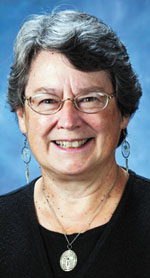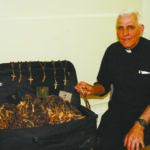By Corrine Winter
Recent political ads as well as comments I have heard and read closer to home regarding terrorism and immigration urge me to review Catholic teaching on Islam. Some seem to assume that valuing their own religious tradition means rejecting all other traditions as false. But that is not the mode of Catholic Tradition. Indeed, Catholic bishops as well as the pope have called Catholics to develop greater dialogue and work toward mutual understanding with Muslims in order that we might work together toward the peace that we all desire.

In December, the Messenger noted the anniversary of the Vatican II document on Non Christian Religions (Nostra Aetate). The Council Fathers state that the church holds a “high regard” for Islam whose religion calls for worship of one God, respect for Jesus Christ and for Mary, moral integrity, and compassion for the poor. Discrimination against any people based on their religion is described as “foreign to the mind of Christ.” Blessed Pope Paul VI, who promulgated Nostra Aetate, expressed his admiration for the followers of Islam on several occasions. In 1979, St. Pope John Paul II spoke of the value of Islam in the struggle against materialism and called for cooperation among the religions in that quest. In 2007, Muslim scholars wrote “A Common Word between Us and You,” which also expresses the conviction that Christians and Muslims have in common belief in love of God and of neighbor.
The Catholic Bishops of Canada outline seven beliefs that they find to be shared between Catholics and Muslims: the worship of one God, belief that God is the creator of all and is self-revealing, anticipation of a day of judgment and of the resurrection of the dead, and the call to live according to moral principles and to pray, fast and give alms.
Recognizing our shared values doesn’t mean, of course, that we deny or minimize important differences in our beliefs. Muslims deny key Catholic beliefs in the Trinity, in the Incarnation of God in Jesus Christ, in the death and resurrection of Christ, and in the salvation offered through the work of Jesus Christ. We may also have different understandings of ideas we seem to share, so dialogue must include careful listening and clear explication of each tradition. But appreciation of one another’s belief systems is only one portion of the effort for mutual understanding. Indeed, theological dialogue is generally understood within all ecumenical and interfaith movements to build on dialogues of shared life experience and common work to make a better world.
Muhammed, the founder of Islam, was an orphan and perhaps out of that experience became very concerned about the rights of orphans, widows and the poor. Because he believed that all persons must submit to God alone, he taught that all people are equal before God. His preaching of justice and equality led a number of the rich and powerful to turn against him. To this day, the fasting from dawn to dusk that is observed by Muslims during their month of Ramadan is supposed to lead all Muslims to identify with the poor and to give alms for their protection.
If not every Muslim person consistently demonstrates these values in her/his life, neither does every Christian or even every person who speaks aloud for justice and peace. Living consistently with our own values is a constant struggle. Yes, there are Muslims — and Christians — who distort the religious tradition and find therein some excuse for words and actions totally opposed to the religious tradition itself. Those distortions must be condemned. But the condemnation of or systematic suspicion of everyone who professes any one religious tradition is itself one of those distortions.
Since 1964, the Curia of Rome has included a department dedicated to interfaith dialogue which is considered an important aspect of efforts at evangelization. “Dialogue and Proclamation,” a document published by the Pontifical Council for Interreligious Dialogue in 1991, includes this explanation: “The foundation of the Church’s commitment to dialogue is not merely anthropological but primarily theological. God, in an age-long dialogue, has offered and continues to offer salvation to humankind. In faithfulness to the divine initiative, the Church too must enter into a dialogue of salvation with all men and women.”
(Corinne Winter is a professor of theology at St. Ambrose University in Davenport.)












Hi Ms. Winter,
I agree, we should reach out to Muslims especially “moderate” Muslims, who at great peril are trying to bring sanity to the interpretation of the Quran. Please consider reading Christian Persecutions in the Middle East by George Marlin, published by St Augustine’s Press copyright 2015. I found it to be very enlightening. Would very much enjoy hearing your take on it.
Thank you,
Randy Groepper